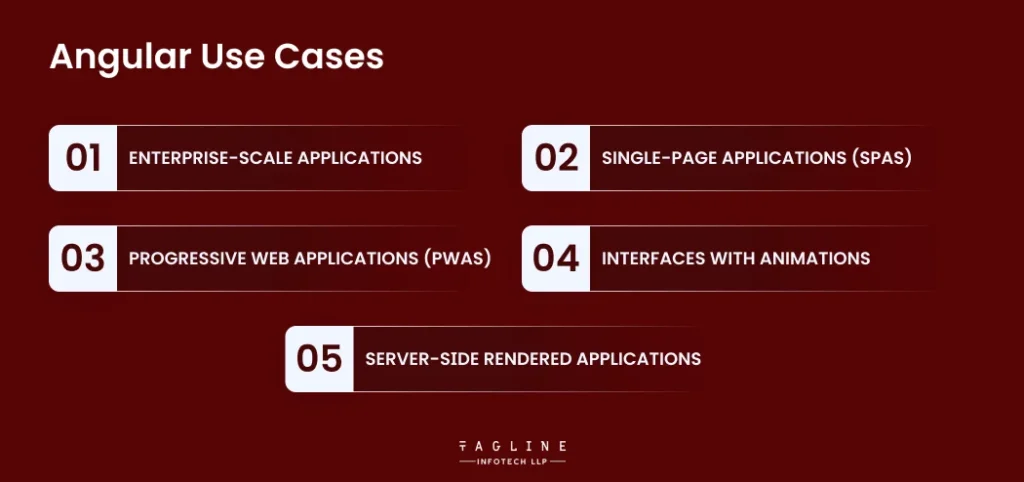Finance & IT Email Marketing: A Data-Driven Approach
February 2, 2026
Home >> AngularJS >> Why Use Angular in 2024? (For Entrepreneurs and Developers)

Quick Summary
Angular is preferred for young entrepreneurs aiming to modernize their businesses and connect with Gen Z audiences. This blog aims to help decision-makers and developers understand how and why use Angular can enhance their web project development. Entrepreneurs favor Angular’s ability to build robust, scalable web applications due to its efficiency, rapid development speed, and seamless integration with other platforms. Developers also have compelling reasons to opt for Angular in front-end development.
StackOverflow’s 2023 statistics, revealed that Angular is favored by professional developers, with 22.5% of those involved in front-end development utilizing this framework. The popularity of Angular has shown a steady trend over the past two years.
In today’s rapidly evolving world, businesses must stay ahead to meet their users’ needs. Entrepreneurs are now prioritizing the development of modern web applications, recognizing the critical importance of an online presence.
Angular is an excellent choice for building these web applications. It provides automation, high performance, flexibility, scalability, and fast development. These features make Angular a preferred option for C-suite executives looking to develop applications that drive business growth.

Angular excels in building enterprise-scale applications due to its strong structure, maintainability, and scalability. With Angular, developers benefit from a well-defined architecture and a robust typing system provided by TypeScript. This setup helps manage large codebases and catch errors early in the development process. Not only this but also, but Angular supports modularity, enabling developers to organize code into manageable and testable modules.
Single-Page Applications (SPAs) are web applications that deliver a single HTML page and dynamically refresh content as users interact with them. Angular is specifically tailored to excel in building SPAs.
Angular’s two-way data binding feature keeps the model and view in constant sync, which minimizes the need for extensive code to update the Document Object Model (DOM). This results in a cleaner and more maintainable codebase. Moreover, Angular’s advanced routing system enables seamless navigation within the app without requiring page reloads.
Progressive Web Applications (PWAs) leverage the latest web technologies to offer a seamless, app-like experience directly through the browser. They are designed to be dependable, speedy, and highly interactive. Angular stands out as an ideal framework for developing PWAs. It comes equipped with a built-in service worker API that manages essential features like caching, background updates, and push notifications. Additionally, Angular Command-Line Interface (CLI) streamlines the process of converting your application into a PWA with just a few simple configuration adjustments.
Angular goes beyond mere functionality to address visual appeal as well. With its powerful animation capabilities, developers can design visually engaging interfaces that include intricate animations. Angular’s animation system adheres to web standards, guaranteeing consistent performance across various browsers. It supports sophisticated sequences and transitions and even enables staggering effects to animate groups of elements sequentially.
Server-side rendering (SSR) is a widely adopted method for rendering a client-side single-page application (SPA) on the server and delivering a fully rendered page to the client. Angular Universal is a framework that facilitates SSR with Angular, boosting performance, particularly on mobile devices and lower-powered hardware. Angular enhances SEO-Friendly Optimization by making the app’s content accessible to search engine crawlers, making Angular an excellent option for public-facing web applications that need to be easily discoverable.

Entrepreneurs choose Angular for its ability to create dynamic, high-performance web applications. Its robust framework ensures scalability and efficiency, which are essential for growing businesses. An Angular.js Development Company can leverage Angular’s advanced features to deliver innovative and reliable solutions, making it a preferred choice for entrepreneurs aiming to stay ahead in the competitive digital landscape.
Angular enhances consistency in web development by enabling the creation of reusable code blocks through its responsive design framework. This is facilitated by Angular CLI tools, which allow developers to generate consistent, optimized code snippets efficiently from the command line.
Angular significantly speeds up web app development thanks to its technological features. With comprehensive documentation, robust support from Google, and an extensive, active developer community, Angular helps streamline the development process, making it faster and more efficient.
Angular’s focus on code consistency can lead to greater productivity. By enabling modular task division and maintaining organized code, the framework allows teams to collaborate more effectively. This structured approach ensures that productivity is enhanced when the appropriate modules are utilized.
Angular is a cost-effective choice for web development for several key reasons. It enables the creation of multiple iterations of a website using a single codebase, which reduces redundant development efforts. Its extensive range of features and functionalities also speeds up the process of building high-quality websites. Additionally, Angular’s built-in testing tools simplify the identification and resolution of bugs early in the development phase, minimizing the risk of costly issues later on.
Angular excels in supporting scalable application development through its modular framework. It offers pluggable modules, lazy loading, comprehensive testability, and a single data flow, along with self-contained functionality and state management similar to Redux. This structure allows for effective collaboration across larger teams and simplifies the management of complex applications with multiple codebases, making it easier to scale projects.
Angular delivers strong performance through its adaptable features, such as template syntax, Angular CLI, and advanced routing mechanisms. These capabilities contribute to faster application loading times and efficient rendering of user interfaces. Angular’s compatibility with various backend technologies ensures that data from multiple sources can be presented effectively, enhancing the overall user experience.

Angular provides substantial benefits for developers, making it a preferred choice for many. Here are some key reasons to consider Angular:
Angular employs HTML to define both the structure and behavior of applications. HTML’s simplicity, combined with Angular’s directives like `ng-model`, `ng-repeat`, and `ng-app`, streamlines development. This setup reduces the complexity of managing application flow and element loading, allowing Angular to handle these aspects once your requirements are set.
Angular makes testing straightforward with its use of templates and pre-defined code snippets. This approach promotes consistent coding practices and helps mitigate errors, thereby minimizing potential delays and additional costs associated with debugging and maintenance.
Angular utilizes TypeScript, an extension of JavaScript, to enhance application development. TypeScript provides type safety for primitives and interfaces, which helps in catching errors early in the development process. This integration facilitates more reliable code and reduces the need for extensive maintenance.
Angular’s affiliation with Google ensures a high level of trust and reliability. The framework benefits from robust community support and continuous updates, making it a dependable option for developing secure applications.
Although Angular provides many benefits, it also has some challenges. Here are a few potential issues to be aware of when using Angular for your web development projects:
Angular incorporates a variety of elements such as directives, modules, decorators, components, services, dependency injection, pipes, and templates. For those new to the framework, understanding and mastering these concepts can be quite challenging due to Angular’s extensive and detailed nature.
Angular is often criticized for its complexity. The framework’s detailed and verbose approach can make it more complicated compared to other front-end tools, potentially posing a challenge for developers who are used to more straightforward frameworks.
At times, Angular may experience performance slowdowns. While there are various optimization techniques available, the process of building and refining web projects with Angular can be more time-consuming, requiring additional effort to manage performance effectively.
Angular is a go-to framework for web development when you need something user-friendly, fast to compile, and rich in resources for beginners. It simplifies the development process with its extensive tutorials, documentation, and support, and allows easy integration of third-party tools and components.
AngularJS, the original version released by Google in 2010, has been discontinued. Angular 2 was introduced in 2014 and officially launched in 2016, marking a significant update from its predecessor. Since 2016, the framework has been known simply as Angular, dropping the “JS” from the name, and this term has applied to all versions since then. Although AngularJS is no longer updated, Angular continues to receive regular enhancements. The latest version, Angular 18, was released on May 22, 2024, with new features like Experimental zoneless change detection support and server-side rendering improvements.
Angular’s architecture is built around the Model-View-Controller (MVC) design pattern and employs a dynamic DOM model to facilitate bi-directional data binding. At the heart of an Angular application are several fundamental elements: Modules, Components, Templates, Metadata, Services, and Dependency Injection. Each of these plays a crucial role in the seamless functioning and efficient structure of Angular applications.
Angular’s key features begin with its powerful and user-friendly command-line interface (CLI), designed for seamless setup, usage, and maintenance of Angular applications from the terminal, with regular updates from a dedicated team of engineers.
Angular excels in creating dynamic single-page applications (SPAs) with:
These features make Angular a top choice for developing sophisticated applications without external libraries.
In web development, Angular, React, and Vue are leading JavaScript frameworks. Here’s a concise comparison:
Origins: Angular by Google; React by Facebook.
Common Features:
Key Differences:
Origins: Vue, created in 2014, is the newest.
Distinguishing Features:
Key Differences:
There are specific scenarios where Angular might not be the ideal choice for your project. Here are three situations where you might want to consider alternative options:
Using Angular for websites that primarily consist of static content, which doesn’t require user interactivity, can result in unnecessary complexity and heavier pages than necessary. For such sites, a simpler solution may be more efficient.
Angular is not inherently designed for search engine optimization (SEO). If your primary goal is to optimize a website for search engines, you may find that Angular requires extra effort to achieve effective SEO. However, there are strategies to improve Angular’s SEO performance, which you can explore through Angular SEO techniques.
For applications built using a microservices architecture, Angular might not offer the level of control needed for optimal scalability. Despite being a comprehensive framework, Angular may not fully address the specific needs of projects that rely on microservices.
Several prominent brands, including Microsoft Office Home, PayPal, and IBM, have embraced Angular for their web frameworks due to its numerous benefits. Here are a few notable examples of top websites that use Angular:
Gmail leverages Angular to offer a real-time, single-page application experience. This framework helps Gmail efficiently manage the constant influx of emails and messages, showcasing Angular’s capability to perform well under heavy traffic.
The esteemed business publication Forbes employs Angular to deliver a refined and responsive user experience. Angular supports Forbes in presenting a wealth of content with ease of navigation and functionality across various platforms.
Upwork utilizes Angular to handle essential features such as in-app communication, payment processing, and system testing. Angular’s robust framework supports Upwork’s extensive network, which includes over 18 million users and 5 million clients.
These examples underscore Angular’s effectiveness as a web development framework for businesses seeking to build sophisticated, high-performance applications. If you are aiming to develop innovative web solutions, Angular is a strong candidate to consider.
Angular stands out as a robust framework for web application development, offering numerous benefits compared to other tools. With its fast loading times, customizable animations, and easy scalability, Angular enables the creation of interactive and engaging user experiences. While Angular is effective for small-scale projects, its TypeScript-based architecture makes it particularly suited for larger applications. Despite its versatility, it’s crucial to design with a focus on user needs rather than just the creative and technical aspects of your site. Overall, with its array of features, benefits, and ongoing updates, Angular will remain a premier choice for both entrepreneurs and developers in 2024. Our blog provides comprehensive insights into why Angular is a top choice for app development in 2024. Hire Angular.js Developer from Tagline Infotech specializes in crafting Angular web applications tailored to your specific requirements.
Enterprises favor Angular for its robust capabilities, such as efficient performance, fast load times, and scalability. It supports the development of complex applications and offers a comprehensive set of tools that enhance productivity.
Angular is chosen for development because it provides a rich set of features, including two-way data binding, modular architecture, and extensive support from its community. These attributes help developers build scalable and well-structured applications.
Angular is a framework built on TypeScript for creating dynamic web applications. It is advantageous because it offers high performance, scalability, and the ability to develop interactive, single-page applications with a structured and maintainable codebase.
In 2024, Angular continues to be a preferred choice for development due to its regular updates, extensive feature set, and strong community backing. It remains a reliable framework for building modern, efficient web applications.

Digital Valley, 423, Apple Square, beside Lajamni Chowk, Mota Varachha, Surat, Gujarat 394101
D-401, titanium city center, 100 feet anand nagar road, Ahmedabad-380015
+91 9913 808 2851133 Sampley Ln Leander, Texas, 78641
52 Godalming Avenue, wallington, London - SM6 8NW